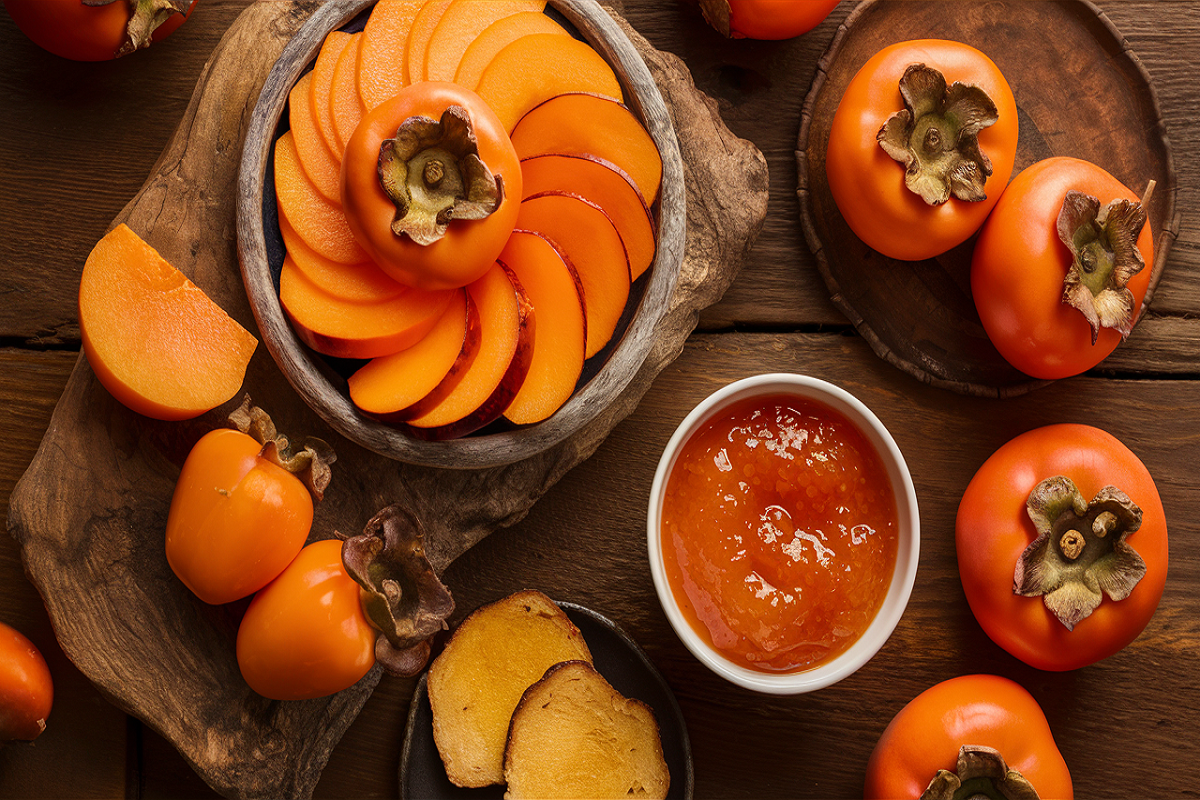
Persimmons
Introduction to the Article
When exploring what flavors go well with persimmon, it’s essential to consider the unique sweetness and texture of this seasonal fruit. This article delves into the various flavors and herbs that best complement persimmons, enriching both sweet and savory dishes. From classic pairings to innovative culinary experiments, you’ll discover how to enhance your cooking with the delightful taste of persimmons.
Introduction to Persimmons
What are Persimmons?
Persimmons, often mistaken for tomatoes due to their bright red color, are actually berries. These fruits thrive during the cooler months of fall and early winter. There are two main types of persimmons: the acorn-shaped Hachiya, which must be fully ripe due to astringency, and the squat Fuyu, enjoyable even when firm.
Persimmons, native to East Asia, have been cultivated for centuries in Japan, China, and Korea before arriving in the United States. Today, they’re a culinary favorite in many parts of the world, celebrated for their ability to adapt to various dishes.
The Popularity and Cultural Significance of Persimmons
Persimmons carry not just a unique flavor but also a cultural significance in many regions. In Japan, they are a symbol of good luck and are often consumed during New Year celebrations. In North America, persimmons signal the season’s change, appearing in markets as the holidays begin, adding color and sweetness to festive dishes.
Their popularity comes from their sweet, honey-like flavor and smooth texture. These traits make them favorites in both traditional and modern recipes. Whether in persimmon pies or vibrant salads, they offer a delicious, visually appealing taste of autumn.
Whether you’re a seasoned chef or a curious foodie, understanding persimmons can unlock a world of flavorful, traditional culinary possibilities. We’ll explore the flavors that complement this delightful fruit next, making your next persimmon dish both mouth-watering and memorable.
Understanding Persimmon’s Unique Flavor
The Taste of Ripe vs. Unripe Persimmons: Exploring What Flavors Complement Persimmons
The flavor of persimmon changes dramatically as it ripens. Unripe persimmons, especially the Hachiya variety, possess a bitter and astringent quality that can be quite unpleasant. However, once ripened, they transform into a sweet and luscious fruit with a depth of flavor that’s hard to match. This sweet taste, combined with a hint of spice, makes ripe persimmons a delight to eat fresh or incorporate into recipes.
On the other hand, Fuyu persimmons are more forgiving and enjoyable even when not fully ripe, providing a crunchy texture with a mild sweetness. Their versatility makes them popular for cooking and fresh eating, as they remain firm in salads and their sweetness deepens when cooked.
Texture and Sensory Experience
Persimmons are unique not just in flavor but also in texture. Ripe Hachiyas have a jelly-like consistency that is perfect for smooth preparations like puddings and jams. Their velvety flesh blends beautifully, adding richness to any dish. Fuyu persimmons, with their firmer texture, provide a satisfying crunch when eaten raw and soften nicely when baked or cooked, making them ideal for a variety of culinary uses.
Eating persimmons is a sensory delight, thanks to their vibrant color and smooth skin, enhancing any dish’s visual appeal. Their unique texture and flavor profile match well with many ingredients, creating dishes that are both tasty and visually striking.
As we explore further, we’ll uncover the fruits and spices that best complement the intricate flavors of persimmons, ensuring that every bite is as exciting as it is enjoyable. By understanding these pairings, you can elevate your dishes and truly showcase the dynamic character of persimmons in your cooking.
Complementary Flavors for Persimmons
Fruits that Enhance Persimmon Flavors
Combining persimmons with other fruits can create delightful symphonies of taste. Citrus fruits, such as orange and lemon, are particularly effective. Their bright, tangy notes contrast beautifully with the deep sweetness of persimmons, elevating both fruits in dishes like compotes, salads, or vibrant winter salsas.
Apples and pomegranates also pair wonderfully with persimmons. Apples provide a crisp texture and a balanced sweetness that complements the softer, richer taste of ripe persimmons. Pomegranates offer bursts of tartness and color, adding visual appeal and a pop of flavor to any persimmon dish. Together, these fruits work to enhance the natural flavors of persimmons, making each dish uniquely delightful.
Spices to Pair with Persimmons: Best Spices that Go Well with Persimmon
Spices play a crucial role in accentuating the sweet profile of persimmons. Cardamom, with its aromatic sweetness, is particularly effective, adding a layer of complexity to the fruit’s flavor. Cinnamon and ginger provide warmth and spice, which complement the honeyed notes of persimmons especially well in baked goods and hot beverages.
For those who enjoy a hint of exotic spice, nutmeg and cloves can be used judiciously. These spices should be added sparingly, as they are robust and can easily overpower the delicate sweetness of persimmons. When used correctly, they contribute a warm, spicy undertone that makes persimmon dishes comforting and inviting during the cold months.
Incorporating these fruits and spices can make the humble persimmon a star ingredient. Blend them into smoothies, add to salads, or bake into festive treats. Understanding these flavors helps you unlock persimmons’ full culinary potential. Next, we’ll explore how to prepare and cook persimmons, highlighting their versatility in both sweet and savory dishes.
How to Cook with Persimmons
Dessert Recipes (Jams, Breads, Pies)
Persimmons shine in desserts, leveraging their natural sweetness. Making persimmon jams preserves their flavor with a hint of lemon and ginger, creating a tangy-sweet spread. Baking persimmons into bread provides a moist, flavorful alternative to banana bread. Persimmon pies feature a rich, custard-like filling, perfect for festive seasons.
Savory Applications (Sauces and Salads)
Not only are persimmons a fantastic addition to desserts, but they also excel in savory dishes. Chopped persimmons add a sweet contrast to salads, pairing excellently with mixed greens, nuts, and a balsamic dressing. In sauces, the fruit’s sweetness complements the savoriness of dishes like roasted pork or chicken, where a persimmon glaze can add a beautiful shine and a burst of flavor.
Innovative Uses in Modern Cuisine: Creative Persimmon Flavor Pairings
Chefs are always finding new ways to use persimmons, expanding traditional flavor boundaries. Persimmon salsas and chutneys add a sweet and spicy kick, pairing well with grilled fish and tacos. Dehydrating persimmons concentrates their flavor, enhancing gourmet cheese boards or as a natural sweetener in granola and snacks.
By exploring these diverse methods of preparation, from simple salads to complex sauces, you can appreciate the full culinary potential of persimmons. This versatility makes them not only a seasonal favorite but also a valuable addition to any chef’s repertoire. As we continue, we’ll delve into some specific recipes that highlight persimmons, helping you bring these ideas into your own kitchen with creativity and flair.
Creative Recipes Using Persimmons
Sweet Treats (Cakes, Pastries)
Persimmons lend themselves beautifully to a variety of sweet creations. A classic persimmon cake, enhanced with a touch of cinnamon and cardamom, offers a moist, flavorful dessert that’s perfect for any gathering. For something a bit lighter, persimmon pastries filled with a mix of persimmon puree and vanilla can be a delightful treat with afternoon tea.
Another innovative dessert is persimmon panna cotta, a silky, smooth concoction that pairs the fruit’s subtle sweetness with the richness of cream. Topped with a sprinkle of crushed pomegranate seeds or a drizzle of honey, it’s a sophisticated dessert that’s sure to impress.
Savory Snacks (Crostinis, Pickles)
On the savory side, persimmon crostinis offer a unique twist to traditional appetizers. Top slices of toasted baguette with a spread of goat cheese, a slice of persimmon, and a sprinkle of walnuts for a combination of creamy, crunchy, and sweet. This simple yet elegant finger food is perfect for holiday parties or as a pre-dinner snack.
Persimmon pickles are another exciting way to use this fruit in savory contexts. Slice firm Fuyu persimmons thin, and pickle them in a brine of vinegar, water, sugar, and spices like ginger and star anise. These pickles make a great addition to salads or as a vibrant condiment to spice up sandwiches and burgers.
Through these diverse recipes, persimmons prove to be an adaptable ingredient capable of enhancing both sweet and savory dishes. Whether baked into desserts or featured in unique appetizers, the possibilities with persimmons are nearly limitless, allowing you to explore a range of flavors and textures in your culinary adventures.
Health Benefits of Persimmons
Nutritional Profile of Persimmons
Persimmons pack a nutritional punch, rich in fiber, vitamins A and C, and manganese. These nutrients boost digestive health, enhance immune function, and support healthy skin. Their low-calorie yet nutrient-dense composition makes persimmons a smart choice for a health-conscious diet.
Antioxidant Properties
Rich in antioxidants like beta-carotene, lutein, zeaxanthin, and flavonoids, persimmons help reduce oxidative stress and may lower the risk of chronic diseases such as heart disease, diabetes, and cancer. These antioxidants protect cells from damage and support overall health.
Heart Health
Regular consumption of persimmons can benefit heart health. The fruit’s fiber content helps lower cholesterol levels, while its antioxidants aid in maintaining healthy blood vessels. Studies have shown that flavonoids in persimmons can reduce heart disease risks by improving blood vessel function and decreasing inflammation.
Weight Management
The high fiber content in persimmons makes them ideal for weight management. Fiber aids in digestion and helps maintain a feeling of fullness, which can prevent overeating and help manage calorie intake effectively.
Eye Health
Persimmons are good for eye health, thanks to their high levels of vitamin A, lutein, and zeaxanthin. These nutrients help protect the eyes from age-related issues and improve overall eye function. They are particularly effective in shielding the retina from harmful UV rays.
Incorporating Persimmons for Health
To maximize the health benefits of persimmons, incorporate them into your diet in various ways. Add sliced persimmons to oatmeal or yogurt for a nutritious breakfast, blend them into smoothies for a healthful snack, or include them in salads for an extra dose of fiber and vitamins. Their unique flavor also makes them suitable for adding a sweet note to savory dishes.
Conclusion
Embracing the versatility of persimmons in your culinary repertoire opens up a world of flavorful possibilities. From the cozy sweetness of jams and bread to the innovative zing of pickles and salsas, persimmons are a standout ingredient that can transform any dish. Their unique flavor profile, combining hints of honey with a subtle tartness, makes them a favorite among chefs and home cooks alike.
As we’ve explored, persimmons pair well with many fruits and spices, enhancing both sweet and savory dishes. Their versatility in recipes, from traditional desserts to modern dishes, showcases their broad appeal. Cooking with such a distinctive fruit brings joy and creativity to the kitchen.
So, the next time you come across persimmons at your local market, feel encouraged to experiment with this exquisite fruit. Whether you’re baking a comforting pie, tossing together a vibrant salad, or crafting an elegant appetizer, persimmons offer a touch of sweetness that can elevate your cooking to new heights. Enjoy the journey of discovering all the delicious possibilities that persimmons have to offer.
FAQs
What flavors pair well with persimmons?
- Citrus fruits – Orange, lemon, and lime offer a bright contrast to the sweet flavor of persimmons.
- Other fruits – Apples, pears, and pomegranates complement persimmons well, especially in salads and desserts.
- Spices – Cinnamon, nutmeg, ginger, and cardamom are warm spices that enhance the sweetness of persimmons.
- Nuts – Almonds, walnuts, and pecans add a nice crunch and nutty flavor that pairs beautifully with the soft texture of persimmons.
- Dairy – Creamy cheeses like mascarpone or soft goat cheese, or ingredients like yogurt and cream, blend well with the fruit’s texture and taste.
What herbs go well with persimmons?
- Mint – Adds a fresh, bright note to persimmon dishes, especially in salads or desserts.
- Basil – Works well in more savory applications or in fresh salads.
- Thyme – Its earthy flavor complements the sweetness of persimmons, suitable for roasted dishes or persimmon tarts.
What not to mix with persimmon?
- Very strong salty flavors – While some salty components can enhance the flavor of persimmons, overly salty or briny foods like olives or capers might overpower the delicate sweetness of the fruit.
- Bitter greens – Some bitter greens might clash with the sweetness of persimmons unless balanced by a suitable dressing or additional ingredients.
- Overly spicy ingredients – Hot spices or piquant sauces might overshadow the subtle flavor of persimmons, though mild spices can complement the fruit nicely.
What is good in persimmon?
Persimmons are rich in several nutrients making them a healthy addition to your diet:
- Vitamins – They are a good source of vitamins A and C, which are important for immune function and skin health.
- Fiber – Persimmons are high in fiber, which helps regulate digestion.
- Antioxidants – They contain antioxidants like flavonoids and tannins, which help reduce inflammation and combat oxidative stress.
Experimenting with these combinations can help you discover the many ways to enjoy persimmons in your cooking. Whether you’re crafting a dessert, a salad, or a savory dish, persimmons can offer a unique and delightful flavor.

